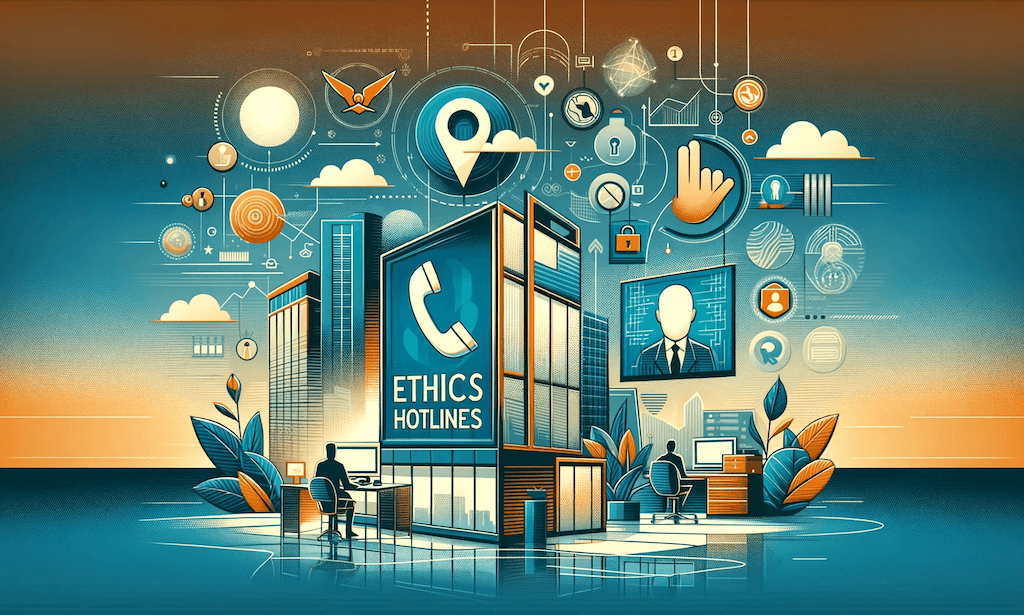What Are Ethics Hotlines?


Resource2024 | Image generated by ChatGPT
In the landscape of corporate governance and organizational ethics, ethics hotlines serve as a critical component in fostering an environment of transparency and accountability. These hotlines are established by organizations to provide employees, and sometimes even customers and suppliers, with a confidential channel to report unethical behavior, misconduct, or violations of company policies. As pillars of an ethical workplace, they play a pivotal role in identifying and addressing issues that might otherwise undermine the integrity and success of an organization. This article delves into the essence of ethics hotlines, their operational dynamics, benefits, and the challenges they face in today’s corporate environment.
The Essence of Ethics Hotlines
Ethics hotlines are designed to be accessible communication channels through which individuals can report, either anonymously or confidentially, any observed unethical practices or concerns within an organization. These can range from financial malfeasance, such as embezzlement or fraud, to workplace issues like harassment, discrimination, or safety violations. The underlying principle is to empower individuals to speak up without fear of retaliation or prejudice, thereby enabling organizations to address problems early on.
How Do Ethics Hotlines Operate?
The operational framework of ethics hotlines varies across organizations but generally includes multiple reporting channels, such as phone lines, email addresses, web-based platforms, or even mobile apps, to accommodate different preferences and ensure accessibility. These reports are then collected, often by a third-party service to maintain anonymity and impartiality, and analyzed to determine the appropriate course of action. The process involves a careful investigation of the reported issue, respecting the confidentiality of the whistleblower while ensuring a thorough examination of the allegations.
Benefits of Ethics Hotlines
Prevention and Detection of Misconduct: By enabling early reporting of unethical behavior, organizations can address issues before they escalate, preventing potential financial losses and reputational damage.
Fostering an Ethical Culture: Ethics hotlines signal an organization’s commitment to integrity, encouraging a culture where ethical conduct is valued and promoted.
Compliance with Regulations: Many jurisdictions require the establishment of whistleblowing mechanisms as part of compliance with corporate governance and anti-corruption laws.
Risk Management: By identifying and addressing ethical issues proactively, organizations can mitigate risks that could have significant legal, financial, and reputational repercussions.
Challenges Facing Ethics Hotlines
Despite their benefits, ethics hotlines face several challenges that can impact their effectiveness. These include:
Underreporting Due to Fear of Retaliation: Employees may hesitate to report misconduct due to fear of backlash, highlighting the need for strong protections and assurances of anonymity.
Cultural Barriers: In some organizational or geographic cultures, whistleblowing may be viewed negatively, discouraging the use of ethics hotlines.
Ensuring Anonymity and Confidentiality: Maintaining the anonymity of reporters, especially in small organizations or in cases involving sensitive information, can be challenging.
Resource Constraints: Investigating reports thoroughly requires significant resources and expertise, which may be lacking in some organizations.
Strengthening Ethics Hotlines
To enhance the effectiveness of ethics hotlines, organizations can implement several measures, including:
Promoting Awareness and Training: Regular training sessions can educate employees about the importance of the ethics hotline and how to use it.
Ensuring Robust Protections: Implementing strict non-retaliation policies and ensuring that these are communicated and adhered to can encourage more reports.
Leveraging Technology: Advanced technologies can help in maintaining anonymity and managing reports more efficiently.
Fostering a Speak-Up Culture: Building a corporate culture that genuinely encourages and values reporting of misconduct is fundamental.
Conclusion
Ethics hotlines are indispensable tools in the arsenal of organizational ethics and compliance. By providing a secure avenue for reporting misconduct, they help in maintaining the moral compass of an organization, ensuring that ethical breaches are addressed promptly and effectively. However, their success depends on the commitment of the organization to truly uphold the principles of transparency, accountability, and protection for those who report wrongdoing. As corporate landscapes evolve, so too must the strategies for managing ethics hotlines, ensuring they remain effective guardians of organizational integrity.